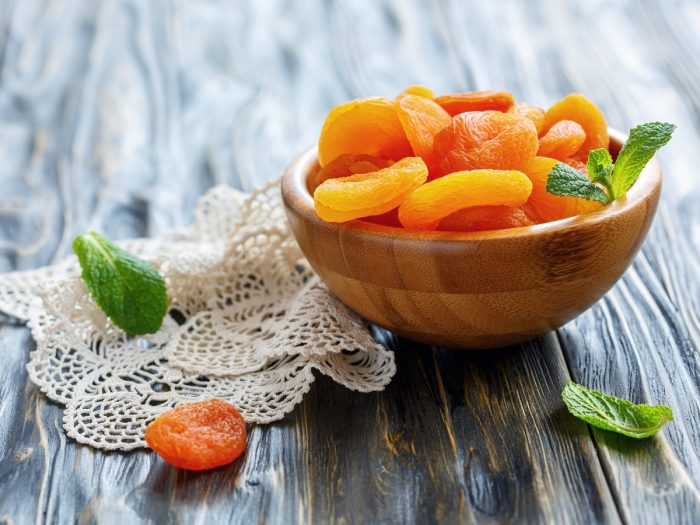Adding dried apricots to your diet is a great way to improve your nutrient intake in a deliciously sweet way.
What are Dried Apricots?
As the name implies, dried apricots are a dried form of the apricot fruit, once they are dehydrated. Fresh apricots are great sources of nutrients, but once they are dehydrated, some other nutrients become more concentrated. As is true of most dried fruits, they provide more nutritional value by weight than fresh varieties. There is a significant amount of natural sugar in apricots, so the dried forms of these fruits don’t require additional sugars or preservatives, unlike some other dried fruits. [1]
Drying out apricots also increases their shelf life, and makes them far more convenient to transport and eat on the go. Apricots are scientifically known as Prunus armeniaca, and the dried form can be found in markets and stores around the world and can be prepared at home. The quality of dried apricots will vary in different parts of the world, as standards for dried fruit can vary in different regions. For example, some dried apricots will contain more water than others, which will mean lower antioxidant levels and higher vitamin C content.

Dried apricots are a summer favourite. Photo Credit: Shutterstock
Serving Size : Nutrient Value Water [g] 30.89 Energy 241 Energy [kJ] 1009 Protein [g] 3.39 Total lipid (fat) [g] 0.51 Ash [g] 2.57 Carbohydrate, by difference [g] 62.64 Fiber, total dietary [g] 7.3 Sugars, total including NLEA [g] 53.44 Sucrose [g] 7.89 Glucose (dextrose) [g] 33.08 Fructose [g] 12.47 Starch [g] 0.35 Calcium, Ca [mg] 55 Iron, Fe [mg] 2.66 Magnesium, Mg [mg] 32 Phosphorus, P [mg] 71 Potassium, K [mg] 1162 Sodium, Na [mg] 10 Zinc, Zn [mg] 0.39 Copper, Cu [mg] 0.34 Manganese, Mn [mg] 0.24 Selenium, Se [µg] 2.2 Vitamin C, total ascorbic acid [mg] 1 Thiamin [mg] 0.02 Riboflavin [mg] 0.07 Niacin [mg] 2.59 Pantothenic acid [mg] 0.52 Vitamin B-6 [mg] 0.14 Folate, total [µg] 10 Folate, food [µg] 10 Folate, DFE [µg] 10 Choline, total [mg] 13.9 Betaine [mg] 0.3 Vitamin A, RAE [µg] 180 Carotene, beta [µg] 2163 Vitamin A, IU [IU] 3604 Vitamin E (alpha-tocopherol) [mg] 4.33 Tocopherol, beta [mg] 0.05 Tocopherol, gamma [mg] 0.08 Tocopherol, delta [mg] 0.01 Vitamin K (phylloquinone) [µg] 3.1 Fatty acids, total saturated [g] 0.02 16:0 [g] 0.02 Fatty acids, total monounsaturated [g] 0.07 18:1 [g] 0.07 Fatty acids, total polyunsaturated [g] 0.07 18:2 [g] 0.07 Tryptophan [g] 0.02 Threonine [g] 0.07 Isoleucine [g] 0.06 Leucine [g] 0.11 Lysine [g] 0.08 Methionine [g] 0.02 Cystine [g] 0.02 Phenylalanine [g] 0.06 Tyrosine [g] 0.04 Valine [g] 0.08 Arginine [g] 0.07 Histidine [g] 0.05 Alanine [g] 0.11 Aspartic acid [g] 0.94 Glutamic acid [g] 0.19 Glycine [g] 0.07 Proline [g] 0.82 Serine [g] 0.09 Sources include : USDA [2]
Dried Apricots Nutrition
The nutritional composition of dried apricots includes about 2 grams of fiber in a 30-gram serving. There is also 1 gram of protein and a negligible amount of fat. Dried forms of this fruit contain less vitamin C than the fresh form, but there are high levels of calcium, iron, potassium, magnesium, and vitamin E. There are also significant amounts of antioxidants and carotenoids in this dried fruit. Per serving, there are only about 70 calories, most of which are from natural sugars. [3]
Dried Apricots Benefits
The best health benefits of dried apricots include its ability to improve skin health, boost vision, soothe the respiratory system, aid bone density, and stimulate circulation, among others.
Skin Care
As with any fruit that has a dense concentration of antioxidants, dried apricots are excellent for neutralizing free radicals and preventing oxidative stress. This can help reduce the appearance of wrinkles on the skin and slow down the aging process, while also boosting skin elasticity and minimizing scars and age spots. [4]
Vision
Carotenoids are well known to improve your vision, as they can reduce oxidative stress in the retinas. This can reduce your chances of developing cataracts, and also prevent macular degeneration as you age. [5]
Respiratory System
The many phytonutrients in these dried fruits can help to suppress inflammation in the throat and sinuses, which can improve overall respiratory health, while the vitamin C content will stimulate the immune system to fight the underlying infection.
Bone Density
With a wide variety of minerals, including iron, potassium, calcium, and magnesium, this dried fruits can give your bone mineral density a serious boost. This is excellent as you age since you are more prone to a loss of bone mineral density and a higher risk of osteoporosis. [6]
Circulation
With a significant level of iron in these dried fruits, apricots are able to improve circulation, since iron is required for the production of red blood cells. Better circulation means more oxygenation to critical parts of the body, as well as the delivery of necessary nutrients. [7]
Constipation
Dried apricots are rich in fiber, regulating your bowel movements by stimulating peristaltic movement. They also improve the nutrient uptake efficiency and strengthen immune function in the gut. [8]
Blood Clotting
Research has shown that dried apricots are able to improve blood clotting in the body. This is great for those with bleeding disorders, but can be dangerous for those taking blood thinners, or if they have certain cardiovascular conditions. [9]
Muscle Development
Although the protein level isn’t huge in these dried fruits, it can still be a healthy boost to your overall protein intake each day, with roughly 1 gram of protein per serving.
